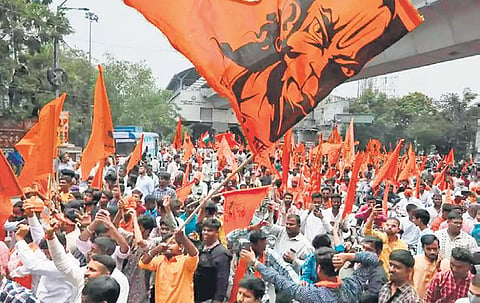

Ever heard of the name Gobinda Patnaik Duggivalasa? The chances are that you have not. Duggivalasa is an Indian national whom Pakistan wanted the UN Security Council (UNSC) to brand as a terrorist. Islamabad flagged the name as an ‘international terrorist’ allegedly involved in terrorism in Pakistan at the UNSC’s ‘1267 committee’. However, three P-5 members, namely, the US, France and the UK, along with Albania, stood by India to reject the motivated Pakistani proposal. Russia was conspicuous by its silence.
“Pakistan’s blatant attempt to politicise 1267 special procedure on terrorism by giving it a religious colour…” India’s Permanent Representative T S Tirumurti said, recalling how the panel had rejected Islamabad’s allegation on Duggivalasa once earlier in 2020. Needless to say, it’s Islamabad’s retaliatory allegation after China as a P-5 member had helped Pakistan by holding back consent, as expected, on the Indian demand for listing notorious Lashkar-e-Tayyiba second-in-command, Abdul Rehman Makki.
Terrorists do not cancel out each other like that. Nor does the post-9/11 American dictum, ‘my terrorists and your terrorists’ the right way to understand terrorism. It is unlike the one that most nations and peoples, including strategic analysts, are confused about — where religion ends and where terrorism begins. In doing so, nations tend to confuse terrorism with religion and brand the latter too as the former. This has consequences, for nations and peoples alike.
Fishing in troubled waters: It is in this background that the observations of External Affairs Minister S Jaishankar on the ‘Prophet row’, involving two office-bearers of the ruling BJP, Nupur Sharma and Navin Jindal, need to be viewed.
He said on a television talk show: “I think this was an issue where the sensibilities and the sensitivities of people were impacted. So they were articulating that.”
“There will be people who will fish in troubled waters,” the minister sought to make the distinction. “International relations is a very competitive game which is not played by Queensberry rules. There will be people who will try to get most of it…” In this context, he pointed out: “The countries not just in the Gulf, I would say even in South-East Asia… who had concerns do appreciate that this was not the position of the Government.”
Jaishankar was reiterating the Government’s position that the two political leaders had made the statements for which their party, the BJP, has initiated action against them. Of course, Government leaders, or even their BJP counterparts, are yet to effectively respond to the statement of Congress’ Rahul Gandhi that it’s the ‘fringe elements’ that form the core of the ruling party — the original reference made initially by the Government’s spokesperson, which was quietly buried, all the same.
As if combining both ideas at a UN programme to mark the first anniversary of the ‘International Day on Countering Hate Speech’, Permanent Representative Tirumurti pointed out how India’s multi-cultural edifice has, over centuries, made it a haven for all those who seek refuge in India, whether the Jewish community or Zoroastrians or Tibetans or from its own neighbourhood. “It is this underlying strength of our nation that has withstood radicalisation and terrorism over time,” he said. “Aberrations are dealt with within our legal framework and we do not need selective outrage from outsiders, especially when they are self-serving, even communal in nature, and pursuing a divisive agenda,” he added.
New normal: As Tirumurti pointed out, “A society based on pluralism, where every religion is respected, is a sine qua non of tolerance and harmony…India has embraced both these principles — democracy and pluralism. And we call on all countries to adhere to these principles to ensure that intolerance is addressed within a constitutional framework.”
The question arises whether all democracies are pluralistic and all pluralistic societies are democratic. Nations like Pakistan and Afghanistan in India’s immediate neighbourhood began as pluralistic societies, but not so anymore. Between them Pakistan has since returned to the democratic path but seems to hate the word ‘pluralism’.
The same is true of the southern neighbour, Sri Lanka. There, every decade since Independence in 1948, hate speeches, hate crimes and other ethnic atrocities involving the majority/majoritarian Sinhala-Buddhist hard-liners against Tamil and Muslim minorities have only increased. The less said about the Maldives the better. The nation, despite becoming a democracy as recently as 2008, with so much fanfare, was careful not to become pluralistic.
The world saw the US of A draw the ‘fine distinction’ (?) between democracy and pluralism when it came to Saddam Hussein’s Iraq. There are other instances in the post-Cold War era, where the West has used democracy as a political weapon to justify its unjustifiable military interventions in pluralistic societies and countries.
The question is also for India, where controversies of the Nupur Sharma-Navin Jindal kind have had the habit of turning from hate speeches into hate crimes, including lynching and worse. Are they just ‘aberrations’ or are they fast becoming the ‘new normal’?
And what has the legal system in the country done through the past years and decades to ensure that democracy and pluralism continue to remain the hallmarks of the Indian nation-state, even if such ‘pluralism’ is not the same as meant by the term ‘secularism’ that was inserted into the Constitution’s Preamble through the notorious, Emergency-era Forty-Second Amendment?
N Sathiya Moorthy
Policy Analyst & Commentator
sathiyiam54@nsathiyamoorthy.com
Policy Analyst & Commentator
sathiyiam54@nsathiyamoorthy.com